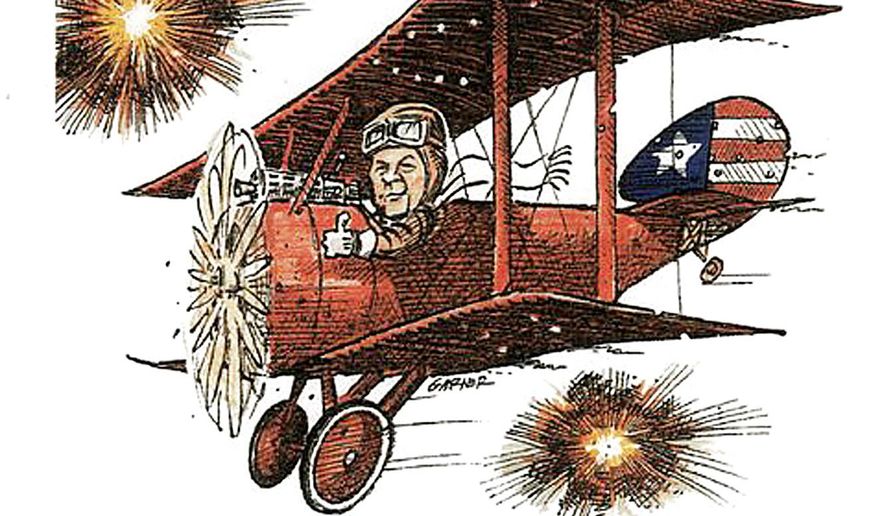OPINION:
The Japanese Zero was one of the most famous fighter planes in the South Pacific, bedeviling American pilots in the early days of World War II. The Zero was quick and nimble, darting from the clouds to inflict death and mayhem, and the Zero hit many a target.
The closest modern equivalent of the Zero on a mission is the Gaffe Patrol, media magpies eager to pounce on an unwary politician — conservative Republicans are favorite targets — who gets a fact askew, mispronounces an unfamiliar word or, worst of all, says something politically incorrect. The Gaffe Patrol has nailed many a coonskin to the wall, in Lyndon Johnson’s famous formulation.
The Zero met its match, and then some, with the introduction of the fork-tailed Lockheed Lightning in 1943, and the Gaffe Patrol seems to have met its match in Donald Trump in late 2015. Try as the brave men and women of the Gaffe Patrol might, they come up with only zeroes of their own in pursuit of the Donald’s lightning. Gaffes bounce off a Lightning like rain and sleet.
When the Donald mispronounced Tanzania the other day in his foreign-policy speech, the Gaffe Patrol streaked aloft in hot pursuit. He pronounced Tanzania the way the word looks — tan ZAY nee uh, accent on the second syllable — and not the way the natives of the East African country pronounce it, tan zu KNEE uh. It was a grave and wicked sin.
The president’s chief flack, Josh Earnest, quickly mocked Mr. Trump’s error. “Apparently the phonetics aren’t included on the teleprompter,” he joked to the reporters at the White House. Mr. Earnest takes particular pride in keeping the president’s overworked teleprompter up to speed, but doesn’t always succeed. Praising the heroics of a medical corpsman, Mr. Obama once pronounced it “corpse man,” and the aim of every corpsman is to keep his wounded charge from becoming a corpse.
The president once confessed that he doesn’t speak the Austrian language, which is not difficult to believe since there is no such language. (Austrians speak German, as every schoolboy is supposed to know.) Mr. Obama once referred to “my Muslim faith” and was corrected by George Stephanopoulos of ABC-TV, a preacher’s son, who reminded him that he professes the Christian faith.
Donald Trump took flak for his Tanzanian sin from the professoriate, too. “I would say that it really doesn’t bode well if somebody who’s campaigning to be the leader of the United States can’t even pronounce the name of the country,” said Priya Lal, an assistant professor of African history at Boston College, who was on temporary duty with the Gaffe Patrol as an assistant apprentice. “That seems like the most basic starting point, it is a serious error and it is ignorant. What comes to mind for me is the contrast between President Obama, whose heritage is east African, in part.”
Indeed. But a mortal sin to an assistant professor of African studies is only a venial sin to most Americans, who rarely think of how to pronounce “Tanzania,” if indeed they ever think of Tanzania at all, or are even aware there is a Tanzania somewhere to think of. Sad but true. Geography is not a strong suit of modern Americans. President Obama was absent from school, perhaps with measles or chickenpox, the day his teacher had set aside for a once-over of American history, and he once boasted to an Oregon audience that he had “campaigned in 57 states, with one more to go.” Fortunately, most of the crates of the Gaffe Patrol were grounded that day by rain and fog, and he suffered little harm.
Mr. Trump’s far more serious offense to what Harry S. Truman called the overeducated class was his using the term “America first” to describe the fundamental foreign policy the Donald says would guide his administration once he gets to the White House. “America first” strikes terror in the hearts of the internationalists in the bunkers of think tanks and those who sup on what a skeptic once called “the globaloney” of the foreign policy establishment.
“America First” was a movement that tried to keep America out of the European conflict that would become, after Pearl Harbor, World War II. The America First Committee, hardly sinister, was presided over by the chairman of Sears, Roebuck and Co., and included such notabilities as the publishers of the New York Daily News and the Chicago Tribune, Walt Disney, Charles Lindbergh, actress Lillian Gish, Sinclair Lewis, Alice Longworth Roosevelt and several senators. John F. Kennedy, a student at Harvard, and Gerald Ford, a student at Yale, sent small contributions to the cause. The committee disbanded three days after Pearl Harbor. They were all committers of gaffes, but in that early day there was none to pursue the wicked.
• Wesley Pruden is editor-in-chief emeritus of The Times.




Please read our comment policy before commenting.